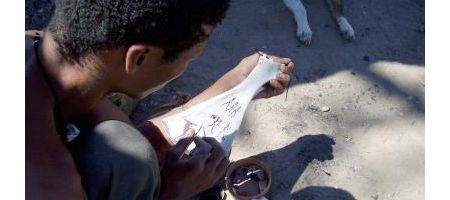The click-speaking Khoe-San people of southern Africa split from the rest of humanity 100,000 years ago, a genomic analysis has revealed.

It was the earliest diversification event in the history of mankind, and came well before the ‘out-of-Africa’ migration of modern humans.
Some 220 individuals from different regions in southern Africa took part in the research, which led to the analysis of around 2.3 million DNA variants per individual – the biggest ever.
“The deepest divergence of all living people occurred some 100,000 years ago, well before modern humans migrated out of Africa and about twice as old as the divergences of central African Pygmies and East African hunter-gatherers and from other African groups,” says lead author Dr Carina Schlebusch of Uppsala University in Sweden.
The team estimates that the San people of northern Namibia and Angola then separated from the Khoe and San populations living in South Africa as early as 25,000-40,000 years ago.
The researchers also looked for signs of ancient adaptations that happened before the Khoe-San lineage separated from other humans.
“Although all humans today carry similar variants in these genes, the early divergence between Khoe-San and other human groups allowed us to zoom-in on genes that have been fast-evolving in the ancestors of all of us living on the planet today,” says Pontus Skoglund of Uppsala University.
Among the strongest candidates here were genes involved in skeletal development – which may have been crucial in determining the characteristics of anatomically modern humans.






